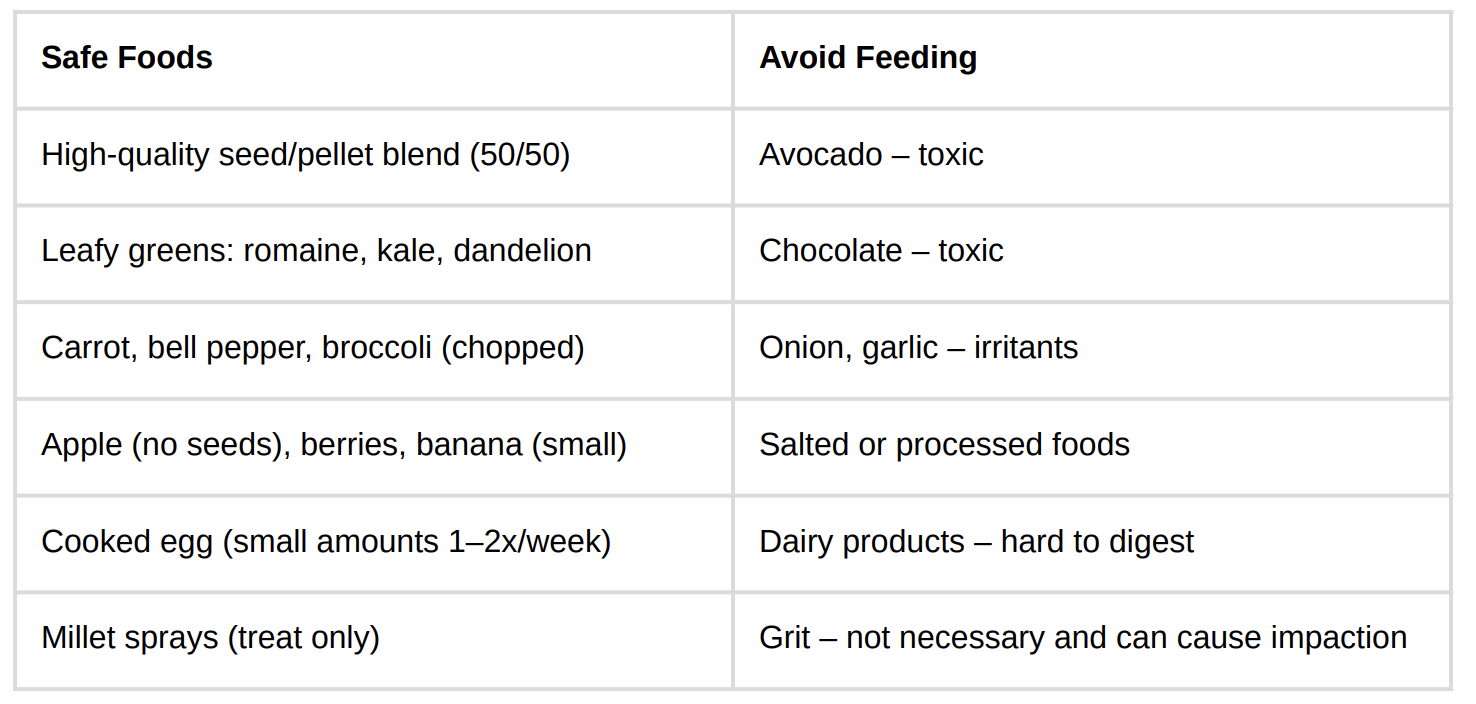Budgie Care Sheet
Overview
Budgies, also known as parakeets, are vibrant, social birds that are popular in the exotic pet trade—though they are not reptiles and therefore not part of the reptile trade. Despite their small size and popularity, budgies are not beginner pets; like all animals, they have unique care requirements that must be met for them to thrive. Budgies need a spacious cage with horizontal bars for climbing, toys for enrichment, and opportunities for daily out-of-cage flight time. They are highly intelligent and active, often vocalizing throughout the day and engaging in play or social interactions. With consistent, gentle handling and positive reinforcement, budgies can become quite tame and enjoy bonding with their human companions. However, they require daily mental stimulation, a varied diet, and regular social interaction to stay healthy and happy. Potential owners should be ready for a lively, interactive bird that thrives on attention and engagement.
Species averages:
Habitat Parameters
Housing recommendations
Budgies need a spacious enclosure that allows flight and exploration. Bar spacing should be no more than ½ inch to prevent escape or injury. Horizontal bars are preferred to encourage climbing. Enrich their space with natural wood perches of varying thickness, swings, toys, foraging stations, and mirrors (if housed solo, mirrors should be used with care).
Cages should be placed in a draft-free area with indirect sunlight and a consistent light-dark cycle. Avoid exposure to smoke, fumes, and scented products. Use paper liners or newspaper in the tray, and clean daily. Disinfect perches, dishes, and toys weekly.
Budgies are social flock animals and should be housed in pairs or groups whenever possible. Solo birds require significant daily interaction and mental stimulation.
Feeding
A balanced diet is essential for budgie health. Seeds alone are not sufficient and can lead to malnutrition and liver disease. Provide a variety of fresh vegetables, formulated pellets, and limited fruit in addition to seeds.
Supplementation
While many pellets are fortified, budgies on mixed diets may still need additional support.
Special considerations
Handling and Training
Budgies can be finger-trained with daily interaction and positive reinforcement. Begin slowly with handfeeding and talking gently. Never chase or grab them suddenly. Regular, gentle handling helps build trust and allows for health monitoring.
Flight time and enrichment
Budgies should have daily out-of-cage time in a bird-proofed space. Provide a variety of toys, puzzles, and perches to prevent boredom and encourage natural behaviors.
Molting
Budgies molt 1–2 times a year. During molting, they may become quieter or more irritable. Increased protein from egg food or pellets helps support feather regrowth.
Speech and mimicry
Some budgies, particularly males, can learn to mimic human speech. Daily social interaction and repetition support this behavior, though not all birds will vocalize clearly.
Common Health Concerns in Budgies
Below are some of the most common medical issues seen in budgies. Subtle behavior changes often signal illness, so prompt vet care is essential.
Psittacosis (Parrot Fever)
Signs: Lethargy, nasal discharge, fluffed feathers
Causes: Bacterial infection, zoonotic (can infect humans)
Nutritional Deficiency
Signs: Poor feather quality, overgrown beak, lethargy
Causes: All-seed diet lacking essential vitamins/minerals
Tumors (especially in older birds)
Signs: Lumps, limping, organ dysfunction
Causes: Genetics, diet, chronic inflammation
Scaly Face Mites (Knemidokoptes)
Signs: Crusty buildup on beak, cere, or feet
Causes: Mite infestation—contagious but treatable
Egg Binding (females)
Signs: Straining, sitting on floor, swollen abdomen
Causes: Low calcium, obesity, excessive egg-laying
These are all concerns we can help with via telemedicine. If you suspect your budgie may be showing any of the signs above, book an appointment at swiftailvet.com for expert exotic pet care from the comfort of your home.
Disclaimer
At Swiftail Vet, we strive to provide accurate, up-to-date information based on current best practices in exotic pet care. However, husbandry standards can evolve quickly. If you notice any outdated or incorrect information on this care sheet, please let us know by emailing info@swiftailvet.com or using the contact form on our website at swiftailvet.com. Your feedback helps us ensure the highest quality resources for pet owners and their companions.
Written by: Wintergreen Vet Services
March, 18, 2025






